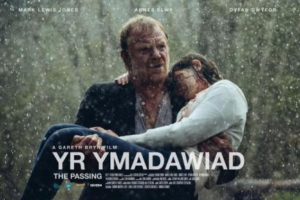
Welsh filmmakers have an advantage over others: world-class landscapes on tap.
Shooting in Wales, filmmakers don’t have to go very far or search very hard to find breathtaking locations that will serve them, are deserving of top billing, and require very little in the way of lighting or design or any other customisation for that matter. Wales’ landscapes can be taken ‘off-the-peg’ and are ‘ready to wear’.
Landscapes in Wales speak volumes, with eloquence, intensity, romanticism, or whatever else filmmakers wish them to evoke; they would speak Welsh if they could. And they give Welsh films signature visuals to be proud of and grateful for, but a film cannot succeed by landscape alone.
The location in Yr Ymadawiad (The Passing, Welsh language with English subtitles, Severn Screen production in association with Boom Pictures) a huge old farmhouse on an expansive plot of remote woodlands in late Autumn/early Winter, is awesome and is captured magnificently (Director, Gareth Bryn; DOP, Richard Stockland; Production Designers, Tim Dickel/Siani Palfrey). With exteriors on tap (apart from the well, perhaps?) the designers were able to focus all their attention on the interiors, which I’m sure required a fair bit of research and deft prop acquisition to make it look and feel like it, too, was found as is. (Unless it was?)
The man we watch with great interest at work in the landscape, his intensity and brutish physique quite profound, adds further grim authenticity. Mark Lewis Jones’s performance as Stanley is consistently strong throughout. The attention to detail in vision and in sound (Composer, Jeremy Holland-Smith credits/Cranc, Post-production sound) are apparent in a way the genre permits; the sound scape works like a treasure map – dropping clues like mad — and the audience excitedly keeps track as they stack up. The amount of time spent on these establishing shots, our prolonged watching of Stanley work and live in exquisite silence, is characteristic of Welsh filmmaking, and the opening scenes are captivating. The absence of the spoken word serves his character well: a simple, lonely and emotionally oppressed man, a man with a secret.
I don’t think the minimalist dialogue serves the other actors or the story in the same way. Use of the fewest possible spoken words seems an intentional stylistic decision (Story, Ed Talfan and Peter Watkins-Hughes), but the combination of this, and other style points — the production’s reliance on landscape; and perhaps, a foreknowledge of Welsh history, and an understanding of its allegorical cultural references to tell the story, hinder the success of the film. Even those in the know want more from a film: they want to hear more, be told more, have to assume less.
Until the other characters, Sara and Dyfan, appear, the film works. Their appearance raises questions. Some are the suspense of the story, others are due to the flaws that impede its flow. Their performances (Annes Elwy as Sara; Dyfan Dwyfor as Iwan) are admirable, but the script does not enable them to fully exhibit their relationship or tell the story. Though beautiful to the eye, as the camera follows with languorous shots, Sara’s passive gazing or her curious meandering though the bare, thick-walled exquisitely-lit rooms, the premise remains unclear for too long, mere snippets of dialogue creating a tension that was less edge of the seat and more an urge for a gear shift. Equally, Iwan’s erratic behaviour raises questions, but the script’s reduced dialogue offers no opportunity for answers, increasingly reducing the impact of the action, and ultimately the pay off.
I was ready to make a lot of space and time for the film as it began to unfold, but I gradually began to feel as though I didn’t want to keep investing in this story because it wasn’t giving. It took too long to get to the point. In all its glory, it languished. The Passing could have been a short.
The Passing is not entirely dissimilar to the collective pool of Welsh films that also treat landscapes, pace, dialogue and storylines this way. Huge credit to film industry professionals whose networks have grown and grown up, taking the Welsh product to a substantially broader marketplace and to the savvy of the producers (Ed Talfan/Kate Crowther) who will have ensured The Passing will be seen on multiple international platforms. I am confident that new audiences will devour it and praise it for the same reasons indigenous audiences are calling for more from Wales’ filmmakers.
